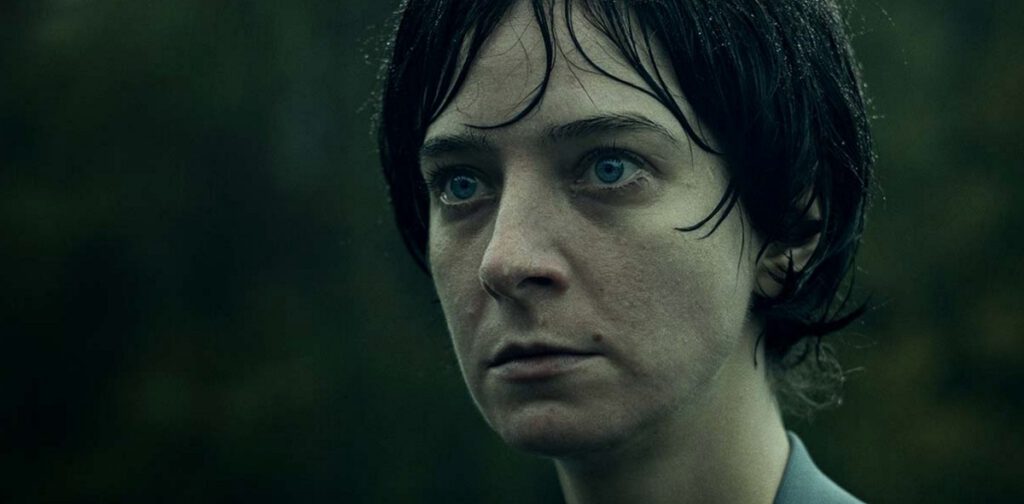The 2017 release of Coralie Fargeat’s film “Revenge” marked a new cinematic era, one where more female filmmakers tackle the exploitative rape-revenge genre through a different gaze. “Revenge,” paired with Natalia Leite’s “MFA” (2017), Isabel Eklof’s “Holiday” (2018), and Jennifer Kent’s “The Nightingale” (2018) took violence against women and weaponized it to portray the real-life horrors of existing in the world as a woman. These films never sidestep the harsh reality of sexual violence, but instead refocus the gaze from delighting in the suffering of the female body to confronting the reality of such pain that is often inflicted by those they love the most. They never lose that core of blood and guts, showcasing that women can craft and direct effective violence that is not only entertaining but also critical to how viewers consume media.
In just a few short years, the subgenre has continued to evolve with upcoming films such as “Rose Plays Julie” (arriving March 19) and “Violation” (available on Shudder on March 25), which ruminate on what it means to have committed such violent revenge, as well as grappling with the PTSD that comes with such trauma. That is not to say previous films haven’t addressed these issues. In “MFA,” Noelle is shown experiencing PTSD flashbacks and struggling with intimacy; “Holiday” has its female protagonist suffer a wordless breakdown in confronting what her boyfriend has done. But catharsis, however brief, is successfully achieved through murder. In “Rose Plays Julie” and “Violation,” that catharsis is denied. Violence is not removed, but instead of the fantastical spurts of gore of “Revenge,” it is cold. Pools of blood congeal like grimy puddles and the sight of it makes the “avenger” vomit rather than continue on with pride. The violence is not necessarily seen as empowering but rather as nauseating which begs the question: what are the emotional consequences of doing what you think is the right thing?

Madeleine Sims-Fewer and Dusty Mancinelli’s upcoming film “Violation” is exactly that kind of narrative as Miriam (the film’s central character played by Sims-Fewer) tries to do what’s right after her sister’s husband and childhood friend, Dylan, rapes her while she is passed out drunk next to a bonfire. It’s a hazy scenario where there is no doubt that Miriam is raped, but the lines are blurred as Dylan thinks it was consensual and her sister thinks Miriam is just trying to ruin her life. Miriam is not always the good guy, and she must struggle with her own morality outside of murder. “Violation” exists in a strange subliminal space where good and bad don’t exist in the traditional sense; instead, it feels like a surreal nightmare where Miriam can never truly anchor herself in reality.
Much of that surrealism comes from the film’s representation of PTSD told through nonlinear storytelling that mimics how traumatic memory can be fractured. Happy memories mix with bad and everything becomes a panic-inducing mess that renders one incapable of functioning. The rape scene is cut in-between long walks and joyful conversations. It is not shown all at once, but in flashes, replicating the fleeting nature of memory. When Miriam is eventually shown being raped, the camera focuses on her hands slowly running through the grass and watching a bug crawl across her fingers. The gaze mimics her bleary gaze as she wakes up still drunk and disoriented. This is not about the act of rape itself, but realization coming in waves.
With this recreation of PTSD comes the extremely graphic revenge Miriam enacts on Dylan, which is filmed in a wide shot. The camera is placed at a distance from the violence, but also makes sure to capture every cut and every moment; the viewer must experience every agonizing moment of this process. The camera never looks away, either, providing an unflinching scene of the steps it takes to dismember a man, from draining his blood to boiling his bones. There is not a quick one-and-down gunshot or a swift castration. Instead, Sims-Fewer and Mancinelli want the viewer to confront this reality of murder and what it means to not only commit the act, but to clean it up to protect yourself.

While a majority of rape-revenge films are told through the lens of a survivor confronting their rapist, Joe Lawlor and Christine Malloy’s “Rose Plays Julie” is a rare movie that examines rape from the perspective of a child who was a product of such trauma. Rose (Ann Skelly) is a veterinary student who feels like she has no anchor for her identity after she discovers she was adopted. But when she finds her birth mother, Ellen (Orla Brady), they both must confront a violent past. Rose’s father raped Ellen, and in trying to bury her pain, Ellen put Rose up for adoption. In removing Rose from her life, Ellen thought she could then remove this part of her past. But, of course, trauma cannot just be brushed under the rug.
“Rose Plays Julie” is about both rape-revenge and multigenerational trauma, as Ellen and Rose work together to navigate how their relationship and identities are defined by violence. Trauma is compounded by the grief of lost potential and love, as Rose mourns a mother that could have been and Ellen mourns her life before the trauma and the loss of a daughter. There is no apology that can bring about an emotional reunion filled with hugs and making up for lost time. Instead, they begin an uneasy alliance as Rose tries to meet her father and help get justice for his actions all those years ago.
Often, the revenge aspect of these films comes in rather quick succession after the character is assaulted. However, in this case, revenge comes decades later, the lancing of a festering wound that has refused to heal no matter how many times you slap a Band-Aid on it and pretend the dull pain doesn’t bother you. But when something is so full of infection, the pain doesn’t go away immediately. Scars remain and there’s nothing to be done to really make those memories go away. Similar to “MFA,” “Rose Plays Julie” shows that while in the moment, revenge feels like the right thing, it will leave you feeling empty. Death does not equal justice, and this canon of films wants to navigate that idea about the triumph and emptiness that comes with catharsis.
“Rose Plays Julie” and “Violation” are crucial additions to the female-directed rape-revenge canon as they expand what such films can explore and how catharsis may not be the release we always wish it to be. Through the lens of female filmmakers, this subgenre has taken on a whole new life that is nuanced, complex, and never provides easy answers. It’s not as simple as a female avenger, but rather women having their trust broken by those closest to them and trying to cope with such emotional devastation. These movies are an unfortunately necessary product of our times where women are given more space to depict the terrifying reality of being sexually assaulted and the frustrating inability to never achieve justice. Sexual trauma is not new. Films about that trauma are not new. But finally, viewers are listening.











